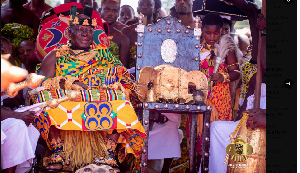Otumfuo Osei Tutu II, the Asantehene, adorned himself with three golden triangular necklaces known as "Adaaboɔ" at the grand durbar commemorating his 25th anniversary on Sunday, May 12, 2024.
Nana Frimpong, a historian, provided insights into the significance of Otumfuo's necklaces during a live telecast on GTV.
He compared the Adaaboɔ to medals awarded to soldiers for valour in war.
He elaborated that, within Asante tradition, the Adaaboɔ necklace is reserved for chiefs who have accomplished remarkable feats for the kingdoms, either personally or through their lineage.
This adornment, he explained, is deeply ingrained in Asante customs, where the attire of chiefs at traditional events reflects the hierarchical structure of the kingdom.
According to him, much like in military services where ranks dictate attire, a chief's rank determines the adornments they are permitted to wear at such durbars.
"The necklace is a triangle, originating from ancient Israel and Egypt. The Amanhene, paramount chiefs wear one, while the Abrempong, other royals do not.
“However, the Otumfuo is entitled to wear up to three. The Abrempong, though royals, cannot don the Adaaboɔ because the hierarchical order does not permit them. It is exclusively the Amanhene who may wear one, and the Asantehene, up to three," he explained.
TWI NEWS
"These ornaments are akin to medals given to soldiers who have distinguished themselves in war. Your rank determines the medal you are entitled to wear. This is similar to the 'ahenema' the sandals that they wear.
“That is why you see some of the chiefs in golden sandals. Not every chief has the privilege to adorn themselves in gold from head to toe," he said.
AM/SARA
Click here to follow the GhanaWeb General News WhatsApp channel
Watch the latest episode of Everyday People on GhanaWeb TV below:
General News of Monday, 13 May 2024
Source: www.ghanaweb.com
Why only Otumfuo is permitted to wear 3 golden triangular necklaces at a durbar
Business
















